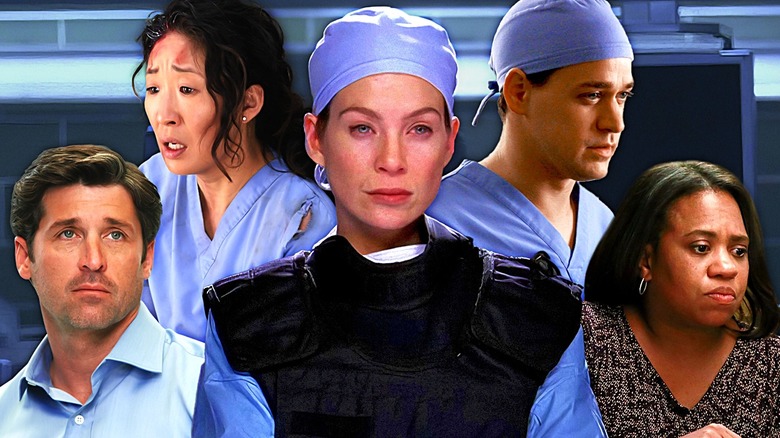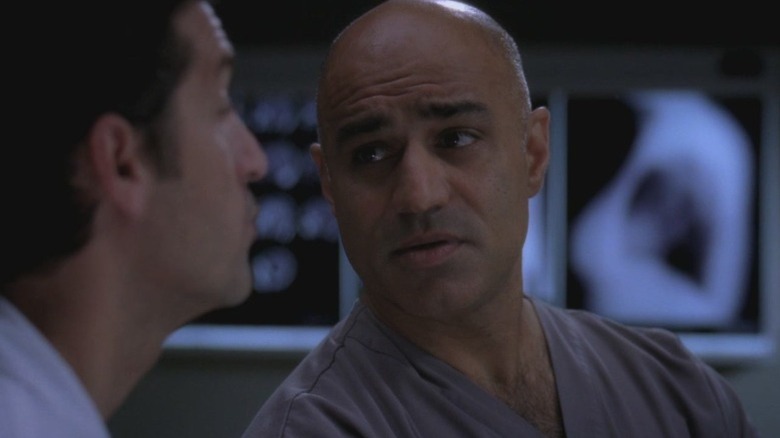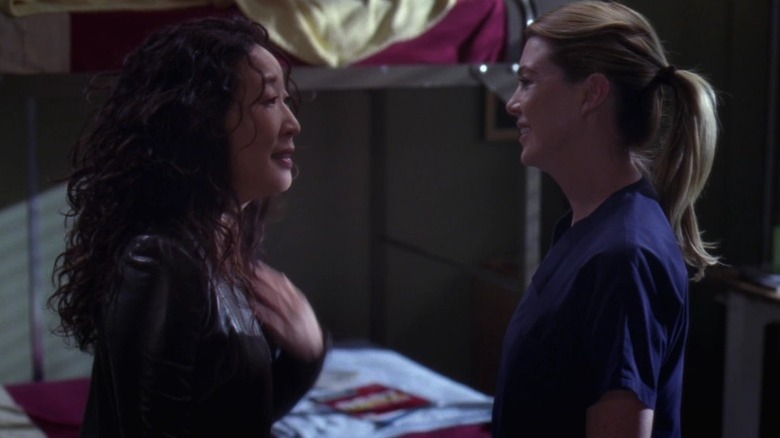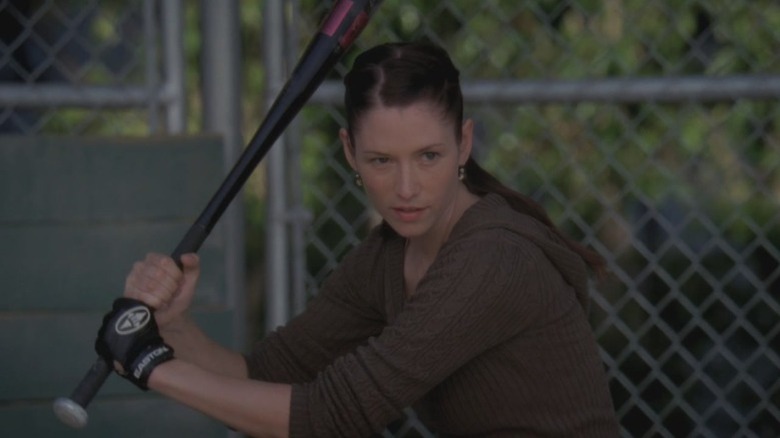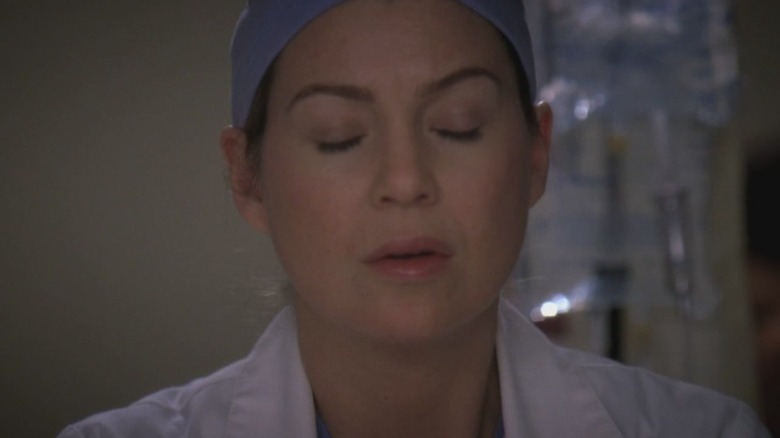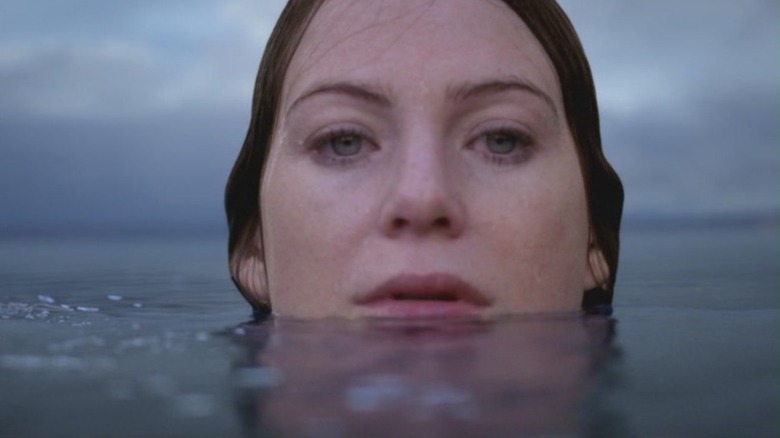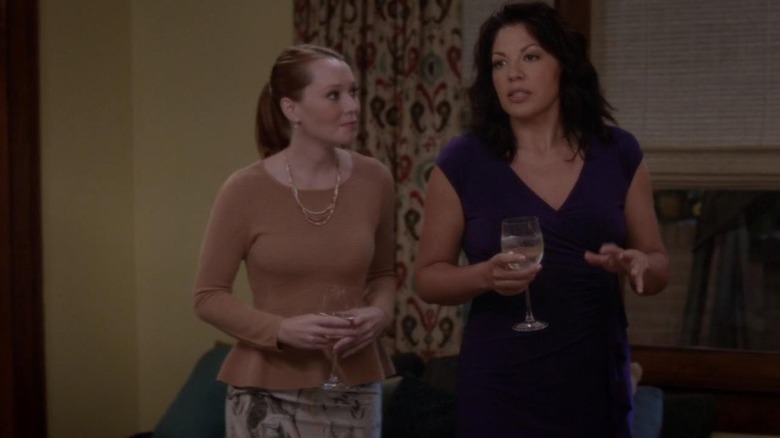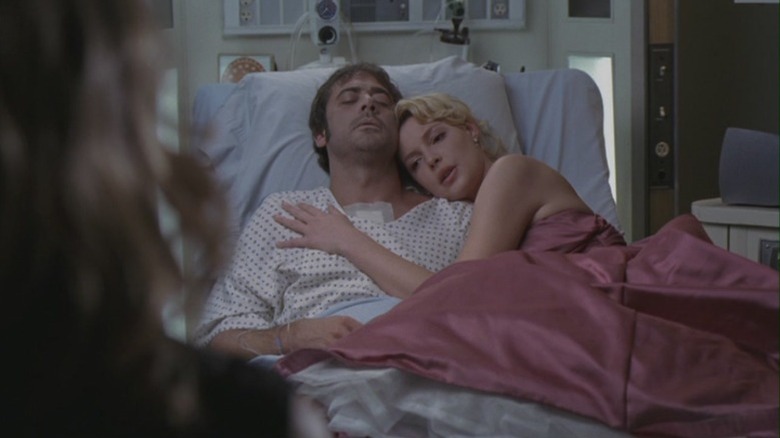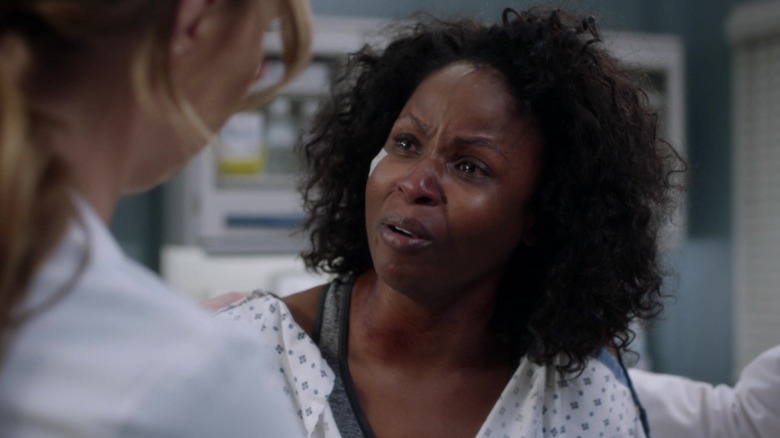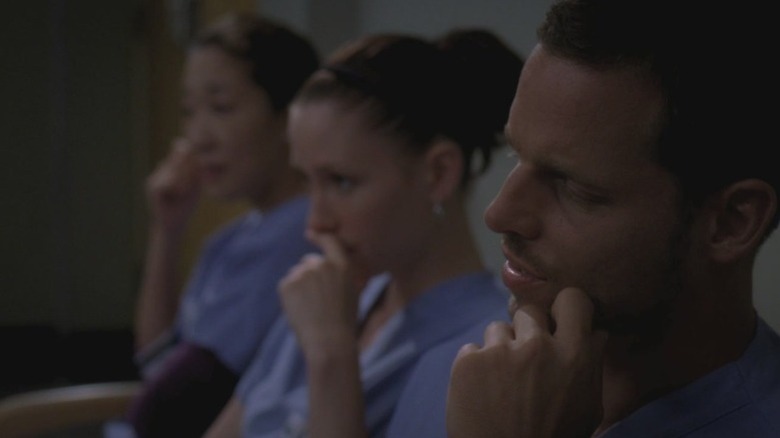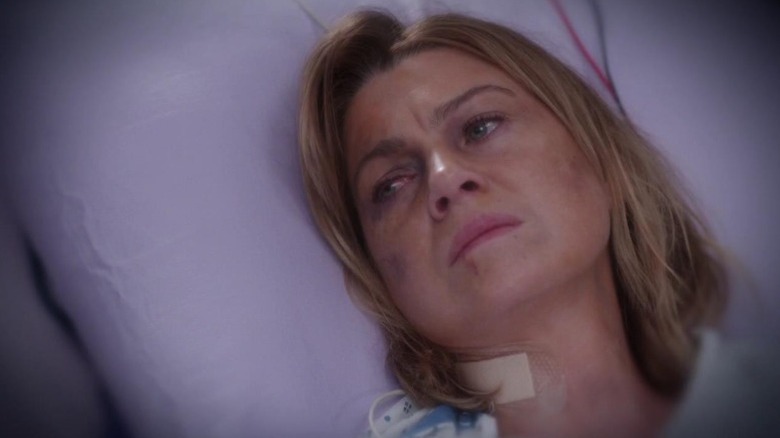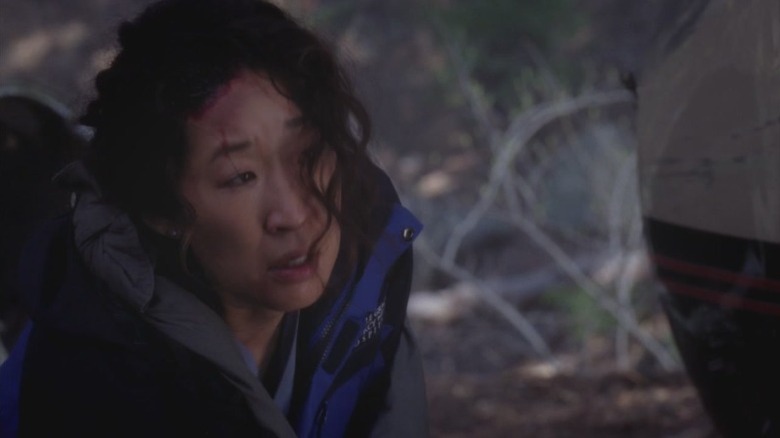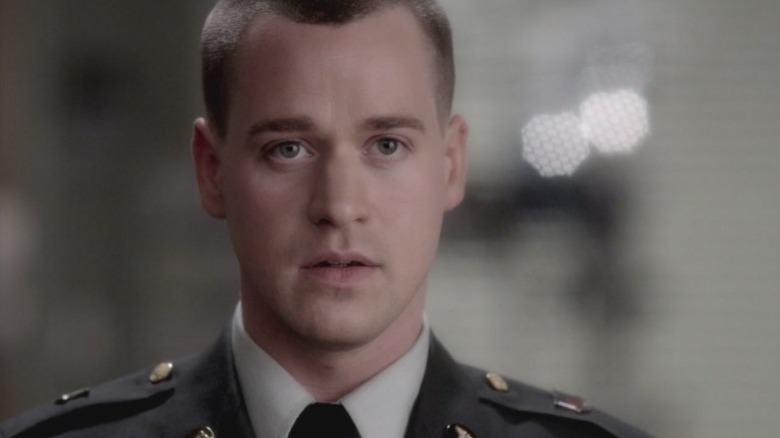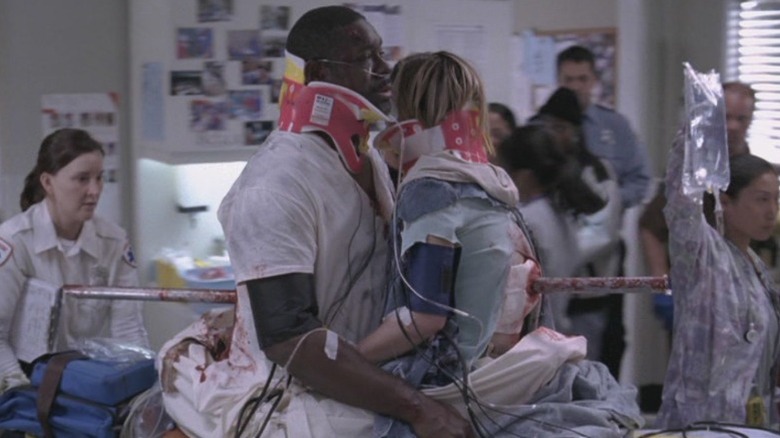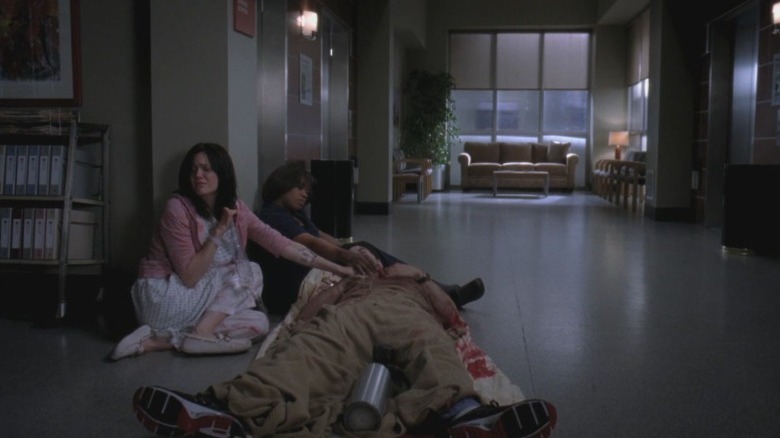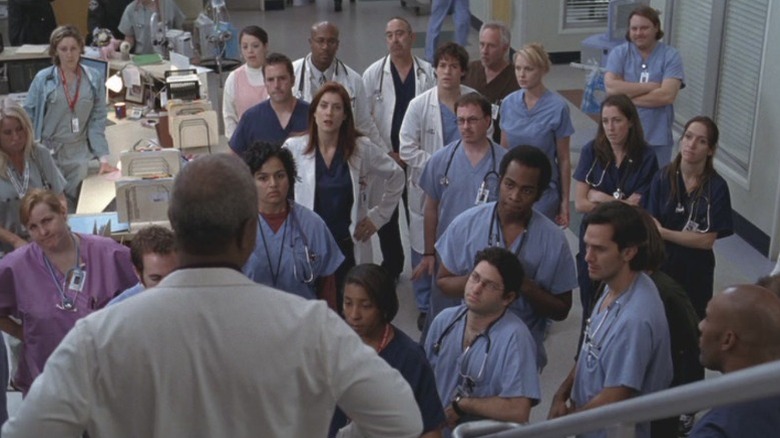The 15 Best Grey's Anatomy Episodes, Ranked
No other series offers the sheer plethora of possible picks for an episode ranking that "Grey's Anatomy" does — and we do mean that quite literally, as the ABC medical show is the longest non-police primetime drama in American TV history. While other iconic long-runners like "The Simpsons" and "Law & Order" ensure renewability by way of stringent episodicism, all but starting over with fresh new stories each week, what makes "Grey's" such a stunning phenomenon is that it's been going for 21 years and 448 episodes (to say nothing of every spin-off show) with genuine, sustained serialization, and the most character-based approach in all of medical television.
In other words, a ranking of the best-ever "Grey's Anatomy" hours (and occasional two hours) is an exercise in revisitation. These are episodes that have carved out a place in fans' and critics' minds as memory milestones in the way that major life events do. Get the tissues ready, and scroll down for a trip through the annals of television's quintessential show about life in extremis.
15. Give Peace a Chance (season 6, episode 7)
"Give Peace a Chance" tells the story of Isaac (Faran Tahir), a hospital lab technician who presents Derek Shepherd (Patrick Dempsey) with scans of a tumor around his leg that nobody else wants to operate on due to the surgery's high risk. Despite Richard Webber's (James Pickens Jr.) orders to the contrary, Derek agrees to help Isaac. Meanwhile, Alex Karev (Justin Chambers) deals with Izzie Stevens' (Katherine Heigl) estrangement — a result of Heigl leaving "Grey's Anatomy" during season 6.
Taut and focused, "Give Peace a Chance" showcases "Grey's" at its most elemental and effective: A vibrant ensemble of doctors collaborating on a draining, days-long surgery and working against the odds to save a life. It's a shining example of how the show can suddenly bring years of thoughtful character drama to fruition in the most gripping possible context, imbuing each bit of teamwork between Derek and the rest of the OR team with layers of significance. To boot, Chandra Wilson immediately proves a master of suspense and closed-quarters storytelling in her very first outing as director on the show, and Isaac is among the most charismatic guest stars in "Grey's" history.
14. Fear (of the Unknown) (season 10, episode 24)
Of all the many, many momentous season finales that "Grey's Anatomy" has given us over the years, none felt more surcharged with the weight of a whole era concluding than "Fear (of the Unknown)," the season 10 denouement that doubled as a goodbye to Cristina Yang (Sandra Oh). The episode is positioned from the start as an extended farewell, with Cristina preparing to leave for a job as Director of Cardiothoracic Surgery at a hospital in Zurich, Switzerland, only for her last day in Seattle to be derailed by a mall explosion.
After 10 years of prospecting perfect nuggets of sentiment week after week, with many of those moments involving cast departures, it seemed as though "Grey's" had little gas left in the tank for another unforgettable send-off — but "Fear (of the Unknown)" turned out to be a doozy. Every major relationship in Cristina's life gets some form of small, impeccable closure, and the story of her attachment to Seattle Grace is brilliantly resolved through a standard-issue "Grey's" crisis that she must recuse herself from helping to fix. If you weren't weeping with bittersweet euphoria at Cristina and Meredith's (Ellen Pompeo) final dance-it-out, are you even a "Grey's" fan at all?
13. Put Me In, Coach (season 8, episode 7)
Known colloquially among fans as "the baseball episode" (technically softball, but who's measuring the field?), "Put Me In, Coach" is as close as we've gotten to a "Grey's Anatomy" breather. It's not entirely that, to be sure: There's still Lexie Grey's (Chyler Leigh) unresolved feelings for Mark Sloan (Eric Dane), Meredith and Miranda Bailey's (Chandra Wilson) ongoing feud, strain in Meredith and Derek's efforts to adopt Zola (Jela K. Moore), and plenty of life-or-death medical drama to contend with.
But still, as the Seattle Grace staff gathers on a diamond field for a softball league match against Seattle Presbyterian, there's a palpable sense of fun, camaraderie, and something like relaxation in the air. The episode's "serious" storylines are still largely filtered through the play, but, with the immediate stakes pared down to the cast's efforts to train for and win a sporting event, the show gets to try out a fresh new kind of storytelling. And, as it turns out, watching these people hang out and strive for something that doesn't involve potential or ongoing tragedies can be an enormous amount of fun.
12. Golden Hour (season 7, episode 15)
The 15th episode of "Grey's Anatomy'"s relatively subdued seventh season, "Golden Hour," was among the show's best hours ever for its long-suffering protagonist — allotting to her, as it did, full centrality in a densely medicine-centric storyline that let Ellen Pompeo and writer Stacy McKee sink their teeth into the essence of Meredith's relationship to medicine and to Seattle Grace. In the plot, Meredith is assigned to run the hospital's emergency room for a whole night.
"Golden Hour" is one of the most quietly momentous episodes in "Grey's" history: In addition to charting Meredith's growth into a doctor capable of handling the stress and the responsibilities of her later promotions on the show, it also kicks off the enormously affecting storyline of Adele's (Loretta Devine) struggle with Alzheimer's disease. But what truly makes it one of the series' most special installments ever is the tight, enthralling focus it exhibits in following Meredith's draining ER shift; this, coupled with the season's various other ongoing storylines, makes "Golden Hour" one of the strongest feats of storytelling in the "Grey's Anatomy" compendium, and an arguable precursor to the real-time intensity of "The Pitt."
11. Drowning on Dry Land (season 3, episode 16)
"Drowning on Dry Land" is among the best-remembered non-finale episodes of "Grey's Anatomy" among fans, and a simple skim of its synopsis helps explain why: Following on from last episode's ferryboat accident, Alex is looking for the family of a pregnant woman with a wounded face, George O'Malley (T. R. Knight) is trying desperately to locate the son of a woman who needs to go into surgery, Izzie is still trying to help a man stuck between cars, and, throughout it all, Meredith is missing after being accidentally pushed into the water by a patient.
It was one of the earliest indicators of how much emotional investment "Grey's Anatomy" could wring from a disaster-centric story, even while most of the main characters were in the position of caretakers as opposed to victims. And, as rationally obvious it might have been that the writers weren't going to kill off Meredith, the threat posed to her life throughout feels genuine and scary — a feat only this show could pull off.
10. Guess Who's Coming to Dinner (season 12, episode 5)
A late-period highlight, season 12's "Guess Who's Coming to Dinner" steps out of Grey Sloan Memorial Hospital to follow a dinner party at Meredith's home, with no major life threats or tragedies involved. Instead, the drama is supplied by a surprisingly profound and metatextual reckoning — a kind of self-reflective meditation on the show's standing after so much narrative change and so many cast departures over the years (including Patrick Dempsey's Derek being killed off a few episodes prior), with much of the conflict stemming from how different everything feels for the characters themselves.
By season 12, "Grey's Anatomy" was inevitably starting to feel like a very different show, and "Guess Who's Coming to Dinner" ultimately proved crucial to the series' renewed longevity by demonstrating it could still serve up a truly great helping of television when it wanted to. Even more impressively, to a greater degree than anything after season 8, it also proved that said greatness could still be derived entirely from the characters and their relationships, massive cast changes notwithstanding.
9. Deterioration of the Fight or Flight Response / Losing My Religion (season 2, episodes 26-27)
Any ranking of "Grey's Anatomy" episodes demands active effort not to default to just a compilation of season finales, but, even though we're trying to prioritize variety on this list, some finales are simply impossible to leave out, as is the case of the two-part season 2 denouement. Concluding the three-part storyline that began with the restaurant shootout of episode 25, "Deterioration of the Fight or Flight Response" follows Izzie's efforts to keep her boyfriend Denny (Jeffrey Dean Morgan) alive after hastily resorting to cutting his LVAD wire, while "Losing My Religion" charts the ensuing investigation, and Preston Burke's (Isiah Washington) recovery following Derek's surgery on his shoulder.
It's one of those gutting, apocalyptic "Grey's" double hours that would feel almost emotionally masochistic to endure, if not for being laced with so much grace and understated poignancy that each of the big tear-jerking moments feels thoroughly earned. And the decision to set such a shattering incident — especially Izzie's tragic, idealism-crushing predicament — against an improvised prom for Webber's dying niece Camille (Tessa Thompson), complete with dashing suits and dresses for all the main cast, is the kind of ingenious flight of fancy that made "Grey's Anatomy" legendary.
8. Silent All These Years (season 15, episode 19)
"Grey's Anatomy" had lost some of its urgency by season 15, but it still managed to produce an absolutely vital hour of TV on that season's nineteenth installment. Airing in early 2019, with a teleplay by Elisabeth R. Finch and direction by Debbie Allen, "Silent All These Years" follows Jo Karev's (Camila Luddington) process of coming to terms with her own traumatic past as she assists Abby (Khalilah Joi), a woman who has been sexually assaulted.
It's a heavy, difficult theme for any show to deal with, let alone one so normally steeped in uproarious melodrama, but the episode stringently commits to a thoughtful, tactful, and profoundly empathetic handling of both Abby and Jo's stories. Insofar as broadcast television has a certain social utility, "Silent All These Years" could be argued as one of the most important TV episodes of the 2010s — a patient, step-by-step dissection of what sexual violence entails for women on both personal and political levels, with solidarity emerging as a lifeline in the face of systemic injustice.
7. I Saw What I Saw (season 6, episode 6)
At its core, "Grey's Anatomy" has always been an ensemble piece first and foremost; the essence of the series is watching a rotating group of big personalities clash, spar, orbit each other, and eventually lock into platonic or romantic harmonies. And no episode made shrewder use of that ensemble structure than season 6's "I Saw What I Saw." With Meredith largely absent as she recovers from a liver donation surgery, the plot sees Webber conduct an investigation into which surgeon was responsible for the medical error that claimed the life of fire victim Cathy Becker (Erin Hayes).
Cristina, Alex, Miranda, Callie Torres (Sara Ramirez), Owen Hunt (Kevin McKidd), Lexie, April Kepner (Sarah Drew), Jackson Avery (Jesse Williams), and more each give their perspective on the events that led to Cathy's death — thus liberating the episode into a prismatic, free-flowing, nonlinear structure that brings the best out of cast and crew alike. The medical conundrum is examined with "House" levels of exacting procedural focus, and, at the same time, the urgency of defending their own innocence brings out new layers in every character. It's "Grey's Anatomy" beamed, mesmerizingly, from a meaner alternate universe.
6. The Sound of Silence (season 12, episode 9)
2016 midseason premiere "The Sound of Silence" is notable as the first TV directing foray of none other than Denzel Washington — who brings an expressive, experimental verve to the proceedings that, despite how he reportedly clashed with Ellen Pompeo on set, may well constitute the show's finest directorial outing.
The key to the episode's unique, incomparable pull is the strain it puts on the character of Meredith specifically: She's viciously attacked by a disoriented patient, and spends the remainder of the hour teetering between life and death, with both her hearing and her speech impaired, as the cast scrambles to both save her and support her through her recovery.
This may be Ellen Pompeo's best performance in the role, and by innovatively sticking to her point of view all throughout, the episode locates a mode of first-person storytelling that casts everything and everyone at Grey Sloan Memorial in a new perspective while intensely amping up the stakes. There are times when "The Sound of Silence" almost feels like something you'd encounter in a European art film festival — a wild and incredible thing for a network drama on its 12th season to offer up.
5. Flight (season 8, episode 24)
Over the years, "Grey's Anatomy" developed a careful, sophisticated alchemy for season finales, based largely on high-low variation: Peaks of bliss, valleys of doom, hope given, hope dashed, last-minute runs, last-second emotional swings. But, in season 8, the show threw all that negotiation out the window. Instead, the season finale, "Flight," just layers despair on top of despair.
Somehow, it works: After so many previous years' denouements primed viewers to expect at least a little grace with their climactic calamities, the relentless bleakness of "Flight" — on which a plane carrying six main cast members crashes somewhere in the woods — feels like a jolt to the system. While there have been fights for survival on other episodes of the show, they never felt so visceral and so utterly transformative of the status quo as they do here. And the decision to end the season not on a cliffhanger but on a note of total irresolution, with Meredith and Cristina clinging fearfully to each other and no rescue yet in sight, is among the gutsiest writer Shonda Rhimes has ever made.
4. Now or Never (season 5, episode 24)
What it came down to with "Grey's Anatomy," so often, was nothing more than crowd-pleasing dramatic television done right — no other network show in the 2000s was so adroit at mining the simple, sure thrills of a cliffhanger, a long-awaited wedding, a gut-punching twist, or a cast death. These primary attention-commanding skills were put on their fullest display in the season 5 finale, "Now or Never" — aka the one where Izzie and George's lives are on the line.
A perfect (and perfectly open-ended) conclusion to one of the show's most affecting storylines ever, the episode brings to a head Izzie's struggle with cancer as deftly as only "Grey's Anatomy" could — which is to say, honoring its season-long hold on viewers' nerves while blindsiding them with the surprise of unannounced, unprepared-for drama. Add to it the fact that writer Debora Cahn somehow found room for Meredith and Derek's note-perfect, minimalistic wedding vows amid the crisis, and it's never been easier to see why "Grey's Anatomy" was the phenomenon it was.
3. Into You Like a Train (season 2, episode 6)
Season 2's "Into You Like a Train" is another classic example of a "Grey's Anatomy" episode that draws heart-rending personal-scale storytelling from a major disaster that floods Seattle Grace with patients — in this case, a train crash. Against the backdrop of Meredith's anguish over being snubbed by Derek in favor of Addison Montgomery (Kate Walsh), the cast handles a variety of severe injuries, all of which come with their own knotty emotions and anxieties. But the centerpiece is, of course, the pole impalement case.
Two of the train's passengers, twentysomething Bonnie (Monica Keena) and middle-aged Tom (Bruce A. Young), are impaled face-to-face across their chests by the same metal pole, forcing the doctors into a situation where they will need to risk the life of one to save the other. The ensuing moral, emotional, and existential dilemmas make up a case study on the show's particular televisual sorcery, starting from an absurd conceit to deliver outsized, irresistible feelings with a finesse that's seldom been equaled.
2. Sanctuary / Death and All His Friends (season 6, episodes 23-24)
If the season 5 finale exemplifies "Grey's Anatomy" wreaking brutal excellence through tried-and-true television formulas, its successor in the finale pantheon finds the show going the extra mile in every possible way.
It's not enough for season 6 two-parter "Sanctuary" / "Death and All His Friends" to just put an active shooter (Michael O'Neill) in Seattle Grace: This has to happen while Meredith finds out she's pregnant and Lexie comes to terms with her feelings for Alex and Cristina breaks up with Owen over his indecision between her and Teddy Altman (Kim Raver).
Then, when the shooting spree starts, every bad thing happens at the same time: The hospital is placed on lockdown with Webber outside, the police shut off the power, and five main cast members are shot. It's an ideal recipe for "Grey's" to go into dramatic overdrive — and, with the writing and acting at the best they've ever been, that unmitigated excess spells nothing but stomach-churningly great TV.
1. It's the End of the World / As We Know It (season 2, episodes 16-17)
Up until the midpoint of season 2, the main thing that distinguished "Grey's Anatomy" as a medical drama was its intimate, diaristic account of the characters' personal lives and complex emotional motivations — all in all, it was a standard soap refined to granular perfection. But on two-parter "It's the End of the World" / "As We Know It," "Grey's" became something else — a show that could do things and go places nothing else on TV would.
The episode's central plot — a man has unexploded bazooka ammunition lodged in his chest cavity, and the hand of paramedic Hannah Davies (Christina Ricci) in the cavity is the only thing keeping Seattle Grace from blowing up — still scans as unbelievably out-there decades later. But that only makes the show's fabulous navigation of that plot, painting a full emotional journey for every character on the scene as everyone sweats over the threat of imminent death, all the more impressive. From this moment on, "Grey's Anatomy" was the land of big swings, the platonic ideal of mass-appeal storytelling about humans in all-consuming crisis. In many ways, the Shonda Rhimes empire was born here.
